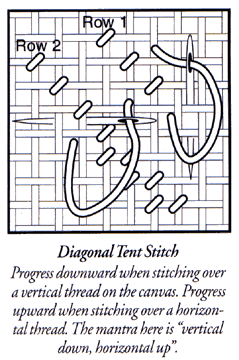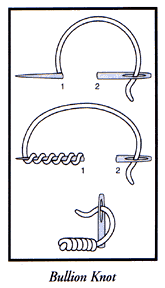Stitching Instructions:
1. Run a basting thread through the middle of the canvas both
horizontally and vertically to help with the counting. Attach
to frame with tacks about every 1/2".
2. The tent stitches in this project are worked on the diagonal
as shown in the stitch diagram. Use three strands of floss or
metallic in your needle. Strip the threads and lay each stitch
for better coverage and a smoother surface.
3. Start at the top and work the tree, saying and bird. The
saying is worked in the gold metallic using one strand of 406
and two strands of 407. The bird has a French knot eye worked
with 1 strand of Ultra Dk. Coffee Brown. The sky is worked in
a random fashion using one strand of Ocean Spray and two strands
of Ultra Very Lt. Antique Blue. Because Ocean Spray is overdyed,
varying values of light and dark will occur. To capitalize on
this fact and to keep from having long diagonal streaks in your
work, work the sky in smaller areas about the size of a thumb
print. Whenever you see a dark streak developing, stop the diagonal
pattern and complete several stitches together, then revert back
to the diagonal tent stitch again. The main thing to
remember is to break up your stitching into small irregularly
shaped areas. Several places are stitched with 3 strands of only
Ultra Very Lt. Antique Blue, for example, around the bird and
to the right of the tree. You can hide the date by cross stitching
it with 2 strands of Ocean Spray and working the background around
it Ultra Very Lt. Antique Blue.
 ----
----
4. The face and legs of the baby lamb are stitched in diagonal
tent stitch with Ecru. Using 2 strands of Broider Wul, fill in
the lamb's body with French knots, working the outside edge first
to establish the shape. A lazy daisy stitch worked in 1 strand
of Impressions is used for the ear. Backstitch the lamb following
the picture. A small straight stitch forms the eye. Use 2 strands
of Ultra Dk. Coffee Brown for backstitching and eye.
5. Work the face, ears and feet of the mother sheep in diagonal
tent stitch using 3 strands of Antique Parchment. You may find
it easier to baste or backstitch the shape of the sheep onto
the canvas for ease in placing your next stitches. A semi circular
line on the sheep's chest also appears on the graph. With 1 strand
of Impressions # 1146, fill in the top of the sheep's head and
above the semicircular line with French knots. It is better to
outline each area completely with French knots and then fill
in. Around the rest of the sheep's body, place French knots about
every 2-3 threads to form a general shape. These French knots
are Impressions # 1146 using 1 strand. Fill in the remainder
of the sheep's body with bullion knots in Palomino overdyed wool,
using 1 strand. Refer to picture for directional information.
Wrap the needle about 7-8 times and cover 3-4 canvas threads.
The empty places left after doing this, can be filled in with
French knots worked with Impressions # 1146. The nose and lower
portion of the sheep's face were backstitched with 2 strands
of Ultra D. Coffee Brown. Refer to the picture for this.
6. Work the flowers and fruits where indicated, using diagonal
tent stitch. French knots, using 2 strands of Lt. Old Gold, accent
the strawberries and center of red flower. The apple tree has
French knot "apples" stitched with 2 strands of Dk.
Salmon. There is an apple near the base of each leaf. Refer to
the picture for this. The 3 yellow flowers have centers worked
with 2 strands of Mahogany in French knots.
7. The hills are worked entirely in diagonal tent stitch.
Follow the graph or your own whims when shading the hills. Careful
counting is definitely not a priority!
8. If desired, add your own initials in the lower right hand
corner, using the metallic gold.
Copyright: Barbara Jackson for the Historic Needlework
Guild, 1997
Welcome Little Stranger has been
provided courtesy of The Historic Needlework Guild from
the Winter 1998 (Volume 2, Number3) issue of Fine Lines magazine.
For more information on the Guild and its publications, see their
website at http://www.historicneedlework.com

COPYRIGHT NOTICE: These instructions
and designs are provided for the personal use of our web site
visitors. Any other use be it reproduced or distributed in any
other form (including electronic) must have the prior written
permission of The Historic Needlework Guild.


